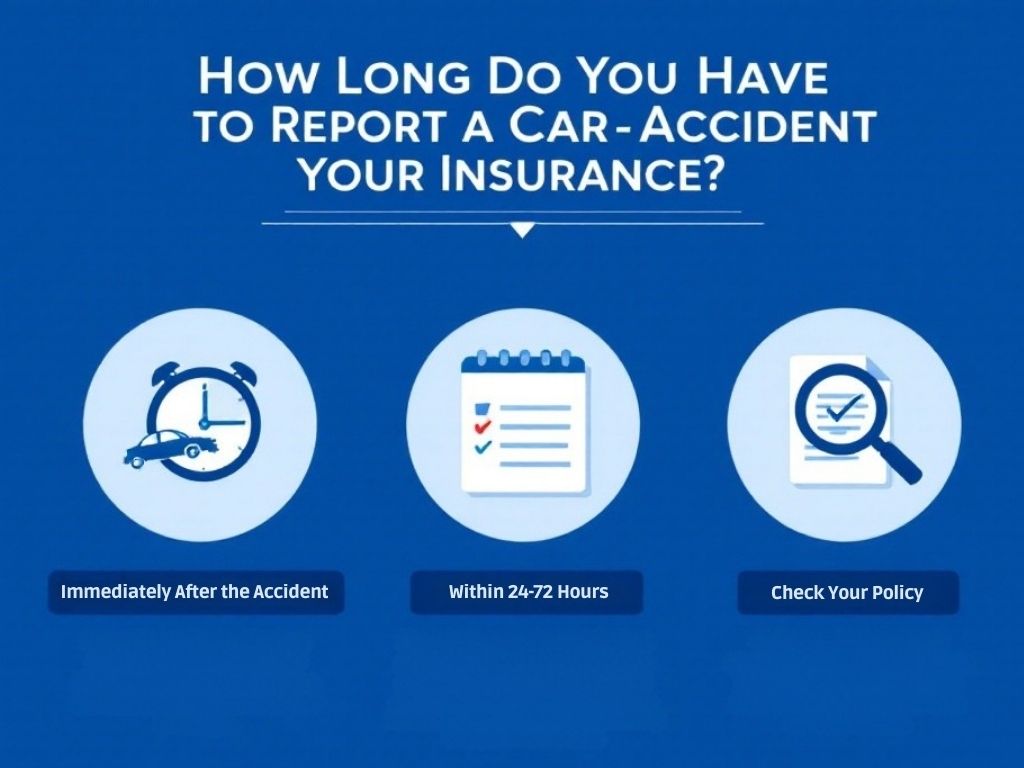Being involved in a car accident is stressful enough without the added pressure of insurance deadlines. Understanding the timeframe for reporting an accident to your insurance company is crucial for protecting your rights and ensuring your claim proceeds smoothly. This comprehensive guide explores the reporting timelines, potential consequences of delayed reporting, and best practices for Michigan drivers.
Standard Insurance Reporting Timeframes
Most insurance policies contain specific language regarding accident reporting timeframes. While these requirements vary by insurer, the standard reporting windows typically fall into these categories:
Immediate Reporting (24-48 Hours)
Many insurance companies use language in their policies requiring “prompt” or “immediate” notification. In practical terms, this generally means within 24-48 hours of the accident. This short window is particularly important for accidents involving:
- Injuries to any party
- Substantial property damage
- Multiple vehicles
- Hit-and-run incidents
Short Window (3-7 Days)
Some policies provide a slightly longer notification period of 3-7 days. Even with this extended timeframe, it’s advisable to report the accident as soon as possible while details are fresh and evidence is more readily available.
Longer Reporting Periods (10-30 Days)
A minority of policies may allow reporting within 10-30 days. However, even if your policy permits this extended timeframe, waiting this long to report can complicate your claim and potentially raise suspicions with your insurer.
Michigan-Specific Considerations
Michigan’s no-fault insurance system creates additional timing considerations beyond your insurance policy requirements:
Personal Injury Protection (PIP) Benefits
Under Michigan’s no-fault system, you must file an application for PIP benefits within one year of the accident to receive coverage for medical expenses, lost wages, and other benefits. This deadline is statutory and generally cannot be extended.
Mini-Tort Claims
For vehicle damage claims under Michigan’s mini-tort provision, the statute of limitations is three years. However, this legal deadline is separate from your contractual obligation to promptly notify your insurer of the accident.
Uninsured/Underinsured Motorist Claims
If your accident involves an uninsured motorist or you’re pursuing underinsured motorist benefits, specific deadlines in your policy apply to these claims—often with shorter notification periods than standard claims.
Consequences of Delayed Reporting
Failing to report an accident within your policy’s specified timeframe can have serious repercussions:
Claim Denial
The most severe consequence is outright claim denial. Insurance companies may argue that delayed reporting prevented them from:
- Conducting a timely investigation
- Interviewing witnesses while memories were fresh
- Examining vehicles before repairs
- Protecting against fraudulent claims
Coverage Limitations
Even if your claim isn’t denied entirely, late reporting may result in limited coverage or additional scrutiny during the claims process.
Presumption of Fraud
Significantly delayed reporting can trigger fraud investigations, as insurers may view the delay as an attempt to misrepresent facts or fabricate damages.
Difficulty Proving Damages
As time passes, documenting injuries and property damage becomes more challenging, potentially reducing your compensation.
Exceptions to Standard Reporting Requirements
Some circumstances may justify delayed reporting:
Medical Incapacitation
If your injuries prevent you from reporting the accident, insurers typically make reasonable accommodations once your condition is documented.
Unknown Damage
Sometimes damage isn’t immediately apparent, particularly in cases like rear-end collisions where structural damage may not be visible. In these situations, report the accident as soon as you discover the damage.
Lack of Information
If you initially lack necessary information to file a report (such as in some hit-and-run accidents), document your attempts to gather this information to demonstrate good faith efforts.
Best Practices for Accident Reporting
To protect your interests and ensure smooth claims processing:
Report Immediately
Even for minor accidents, notify your insurance company as soon as reasonably possible—ideally within 24 hours.
Document Everything
Before calling your insurer:
- Take photos of all vehicle damage and the accident scene
- Collect contact and insurance information from all involved parties
- Gather witness information
- Note the location, time, and weather conditions
- Record police report numbers if applicable
Limited Initial Statement
When first reporting the accident:
- Stick to basic facts about when and where the accident occurred
- Avoid speculation about fault or making recorded statements about injuries
- Don’t provide unnecessary details until you’ve consulted with an attorney
Follow Up in Writing
After verbal notification, send written confirmation of your report through your insurer’s preferred method (online portal, email, or mail), creating a record of your timely reporting.
Special Circumstances
Additional reporting considerations apply for accidents involving:
- Commercial vehicles or semi-trucks
- Rideshare services like Uber or Lyft
- Public transportation vehicles
- Drunk drivers
- Road defects
These situations often involve multiple insurance policies and require particularly prompt reporting.
When to Consult an Attorney Before Reporting
While prompt reporting is essential, in some situations, consulting with an experienced attorney before making detailed statements to your insurance company may be advisable:
- Accidents resulting in serious injuries
- Fatalities or life-altering injuries
- Complex multi-vehicle accidents
- Cases where fault is disputed
- Situations involving potentially defective products
- Accidents with government vehicles
An attorney can help frame your initial report to protect your interests while still meeting notification requirements.
Conclusion
The simple answer to how long you have to report a car accident to your insurance is: as soon as possible, preferably within 24-48 hours. While your specific policy may allow longer reporting periods, prompt notification is always the safest approach to protect your rights and ensure full coverage.
For accidents resulting in significant injuries or complex liability scenarios, consider consulting with a qualified attorney who can guide you through both the insurance reporting process and any potential legal claims. This dual approach ensures you meet all technical requirements while positioning yourself for maximum recovery.
This information is educational in nature and should not be construed as legal advice. Insurance policies vary, and specific terms in your policy govern your reporting obligations. When in doubt, consult your policy documents or speak with a qualified attorney about your specific situation.


